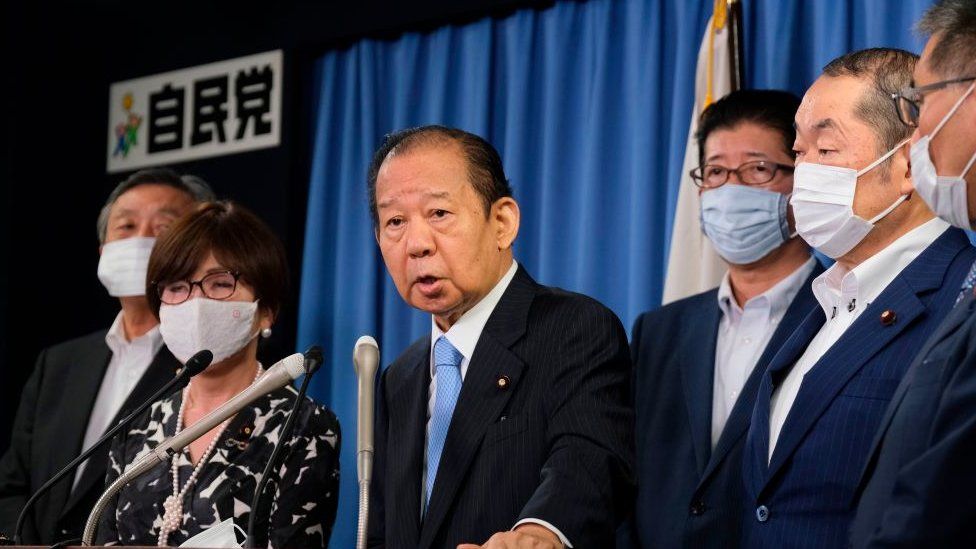Japan's LDP party invites women to 'look, not talk' at key meetings
 image copyrightGetty Images
image copyrightGetty ImagesDays after Japan's Olympics chief was forced to resign over sexist comments, the ruling party has decided to invite women to attend key meetings - as long as they do not speak.
The Liberal Democratic Party proposed allowing five female lawmakers to observe its all-male board meetings.
They cannot talk during the meeting - only submit opinions afterwards.
The Tokyo Olympics organising committee chief had sparked a firestorm by saying women talked too much in meetings.
Yoshiro Mori, 83, had remarked, in discussions over increasing the number of female board members, that "we have to make sure their speaking time is restricted somewhat, they have difficulty finishing."
He resigned on Friday for what he called his "inappropriate remarks".
Toshihiro Nikai, the 82-year-old secretary general of the Liberal Democrat Party (LDP), told a news conference on Tuesday of the plan to bring a female perspective to the all-male board meetings.
He said he was aware of criticism of the male domination of the party's elected board and it was important that female members of the party "look" at the decision-making process, he was quoted by Reuters as saying.
"It is important to fully understand what kind of discussions are happening. Take a look, is what it is about," he said.
Japanese media reported that the five women would be allowed to sit-in as observers on decision-making board meetings but would not be allowed to speak. They could submit their opinions to the secretariat office afterwards.

Casual sexism 'a familiar tactic'
By Mariko Oi, BBC News
As a Japanese woman, casual sexism is what I unfortunately got used to over the years. It may happen at business meetings, work drinks or family gatherings. At those moments, many of us just laugh, pretend we didn't hear it and move on.
That's why Mr Mori's comments didn't surprise me, and the ruling party's decision to allow non-speaking women to attend their meetings is a tactic we're familiar with.
Under the previous administration of Shinzo Abe, the government set a target to increase the number of female leaders by 2020. When it didn't manage to hit the target, it quietly pushed back the deadline by a decade.
Critics have long argued that instead of trying to increase the number of women for the sake of it, what Japan needs is a fundamental change, from education to hiring practices.

While there has been no immediate response to the LDP's plan from women's groups, there was a huge outcry over Mr Mori's comments.
Major sponsors of the Tokyo Olympics came forward to criticise his comments, including major backer Toyota.
A group of female lawmakers wore white in a protest against his remarks, and Tokyo Governor Yuriko Koike said she would not attend a meeting of high-level Olympic officials in protest.
Some 400 people were said to have withdrawn their applications to volunteer at the Olympic games, which are scheduled for later this year.



No comments